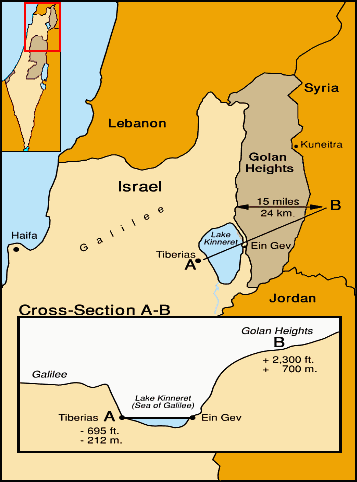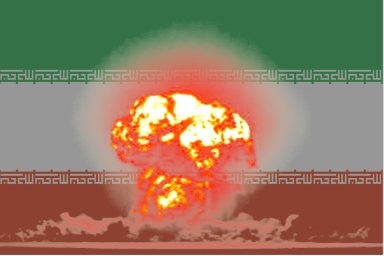A couple of days ago I received an email from a Canadian named Sergei Bourachaga, who wanted me to help him post an article he had written. Here’s what he said:
On May 24, 2008, I submitted to the “Public Message Forum” of The Canadian Coalition For Democracies a lengthy article entitled: “The Koran and The Psychopathology of The Prophet (Part1)”. In less than 24 hours the article was removed and the link (canadiancoalition.com/forum/messages/30711.shtml) created by the google search disconnected. The article was deemed “too offending” to the Muslim Community.
I asked him to send me the article so that I could look it over. Its topic lies within our mission statement, and it contains nothing that violates our posting guidelines, so I am happy to republish it here.

The Koran and The Psychopathology of The Prophet (Part I)
by Sergei Bourachaga
Acknowledgment
While writing this article I have had the enormous good fortune to interact with several academics in the field of psychology, and scholars with extensive expertise of the Arabic language during the Jahilyah period and post Islamic era. I can’t identify them by name because Islamic fanaticism has often relied on violence to silence views and opinions that do not agree with the likes or dislikes of Muslim clerics or community leaders. But still I have to credit them for sharing their knowledge without any reservation. I also relied extensively on the writings of several prominent figures who had addressed through books and essays the psychopathological aspect of the Prophet’s personality. Since their views are part of the public domain, I will list all of them just in case readers of this forum decide to go for an in-depth scrutiny of the psychopath declared by the Koran as “insanoul kamel” (Arabic equivalent for) “an excellent model of human conduct” 33:21, God’s gift to humanity according to Islam, but historical facts show that he was nothing but Satan’s curse to mankind.
One source where a wealth of information was gleaned is Dr. Abbas Sadeghian’s book titled Sword and Seizure. Dr. Sadeghian promotes, with the support of solid historical evidence, the view that Muhammad suffered “complex partial epileptic seizures” clearly reflected through the following symptoms: excessive perspiration, light trembling, olfactory, auditory, and visual hallucinations, and hyper-religiosity. Another good source on the psychological profile of The Prophet is Dr. Hafsa bint Sharif, Ph. D and her essay “Psychological Profile of Muhammad”. Author Robert Spencer produced an excellent book entitled The Truth About Muhammad: Founder of The World’s Most Intolerant Religion, covering the 23-year prophetic career of a narcissist whose ramblings were nothing but distorted views stolen from The Old Testament, The Talmud, and Christianity the religion of his first wife Khadija. According to The Biography of The Prophet by Ibn Kathir, following the first apparition of the angel Gabriel, Khadijah took Muhammad to her cousin, Waraqa ibn Nawfal, a man of knowledge and a Christian who “had studied the books of both the Jews and the Christians very closely and he had learned a great deal from many of their wisest people”. Waraqa confirmed to the couple that humanity has been expecting “The Seal/Last of The Prophets (of monotheism)” and the creature of light Muhammad saw was definitely angel Gabriel. Last but not least I recommend the book titled “Understanding Muhammad: The psychobiography of Allah’s Prophet” written by Ali Sina. A must for the proper understanding of a tyrant whose teachings were behind the massacre of 80.000.000 human beings in India alone, from the day the first Islamic armies invaded the land to present. Mr. Sina places Muhammad in the same league of totalitarian butchers such as Adolph Hitler, Joseph Stalin, and Mao Ze Dong.
 By now too many Canadians are familiar with the Islamic obsessive attachment to the notion that the Koran is the infallible word of God, revealed to Muhammad by Jibril (the Arabic name of angel Gabriel in the Koran), preserved unchanged by Muslim scholars in its authentic form, so perfect that the infallible book together with The Hadith is the basis of The Sharia Law, the “Just Law” that will be implemented and enforced by Muslim Jihadists the day the conquest of this planet is achieved, and the Kouffars/infidels (Jews and Christians) forced to accept the perfect Deen (Arabic for religion) Islam. Of course Islam has a verse “ for the “Perfect Deen” the way it has a verse or a Hadith for every issue that regulates human behavior, thought, bodily functions, from cleansing the self after a bowel movement to dealing with wives or female slaves when they are menstruating, to… Allah announced the “Perfection of Islam” during the “Farewell Pilgrimage” of Muhammad (last one before his death). The Lord reassured him “ This day I have perfected your deen for you and have completed My blessing on you, and have chosen Islam for you as your deen”. The Koran 5:3
By now too many Canadians are familiar with the Islamic obsessive attachment to the notion that the Koran is the infallible word of God, revealed to Muhammad by Jibril (the Arabic name of angel Gabriel in the Koran), preserved unchanged by Muslim scholars in its authentic form, so perfect that the infallible book together with The Hadith is the basis of The Sharia Law, the “Just Law” that will be implemented and enforced by Muslim Jihadists the day the conquest of this planet is achieved, and the Kouffars/infidels (Jews and Christians) forced to accept the perfect Deen (Arabic for religion) Islam. Of course Islam has a verse “ for the “Perfect Deen” the way it has a verse or a Hadith for every issue that regulates human behavior, thought, bodily functions, from cleansing the self after a bowel movement to dealing with wives or female slaves when they are menstruating, to… Allah announced the “Perfection of Islam” during the “Farewell Pilgrimage” of Muhammad (last one before his death). The Lord reassured him “ This day I have perfected your deen for you and have completed My blessing on you, and have chosen Islam for you as your deen”. The Koran 5:3
How valid is the Islamic claim of the Koran’s infallibility? Is it really the “Word of God” or “after-the-fact” claims designed to satisfy the ego of a psychopathic narcissist masquerading as a “Man of God”?
In part one of my essay I will endeavour to prove to the readers of the forum that the Koran is not even a poor imitation of what perfection is. In future essays, I will try to link verses to specific traits in the personality of the Prophet, and the pathological motives that forced him to introduce each and every verse, and exploit them to further his political agenda and satisfy his obsessions. I would like to start with the critical point that Muhammad was an illiterate, and no Muslim or an infidel has ever challenged this point. On the contrary, Muslim scholars have always pointed out with pride that it was a miracle for an illiterate to memorize such a huge volume of Souras (Koranic chapters) and thousands of verses. Muslim scholars conveniently forget that the Prophet was not born in a social, political, and cultural vacuum. He was the product of the Jahilyah period when illiteracy was the norm, and the oral tradition was the dominant means used by Arab tribes to transmit, from one generation to another, folk wisdom, cultural and religious values, linguistic rules and principles, etc…
– – – – – – – – –
Poets, warriors, and tribal leaders of the Jahilyah managed with casual ease, without Divine intervention from Allah, to memorise huge volumes of poetry known at the time as “Qasida”/poem or “Qasaed”/poems. Poets were highly respected for their talents, their exceptional ability to memorize hundreds of lengthy poems, and their mastery of the spoken word. They were highly rewarded by tribal leaders for their valuable role as custodians of tribal history, since no uniform system of writing was developed at the time for the Arabic language, complicated by the fact that isolated tribes developed different dialects in different geographical areas of the Arab world. So it is not a coincidence or a “Miracle” that Muhammad used the same structure of the “Qasaed” to promote his teachings. Too many Arab poets (Muhammad’s contemporaries) from different tribes did notice that there was nothing exceptional about the linguistic structure of Muhammad’s religious statements fashioned in the principles of the Qasaeds. To defend his plagiarism when confronted with such accusations made by Arab poets, Muhammad had to rely on the authority of Jibril the Angel to promote several verses pointing out to his gullible followers that Heaven is the source of his personal views and not the fallible mind of a narcissist parading as a Prophet —
“By the declining star, your compatriot (Muhammad) is not in error, nor is he deceived. He does not speak out of his own fancy. This is an inspired revelation. He is taught by one (Jibril) who is powerful and mighty.” The Koran 53:1-6
“This (the Koran) is a mighty scripture. Falsehood cannot reach it from before or behind. It is a revelation from a wise and glorious God. “ The Koran 41:42-43
Almost four centuries later, one of the giants of the Arabic literature and poetry, Abu al-Ala al-Maarri (973-1057), who was a dedicated rationalist, picked up again the accusations made by Muhammad’s contemporary poets, and declared the Koran and Islam as a travesty. Abul al-Ala wrote several books, the most famous of them was Fusul wal Ghayat, fashioned and structured in the exact style of the Koran to highlight the point that there was nothing “miraculous” or “divine” about the “Holy Book” of Islam, revered strictly by the sheer power of numbers, millions who blindly accepted its tenets. With an obvious contempt for Islam, Al-Marri accused it of dividing mankind into two groups: “One intelligent without a religion, and the other religious without intellect”.
Now let us go back to the claims of the Koran, and scrutinize closely some of the key pillars upon which the entire book rests. The Koran insists in dozens of verses that God is the author of “The Holy Book of Islam”. It points out that:
“He is God in heaven and God on earth; He is the wise One, the All-knowing… ” 43:85
… the source of infinite wisdom, infinite mercy, infinite… ad infinitum.
“We have revealed the Koran in the Arabic tongue that you may grasp its meaning. It is a transcript of Our eternal book, sublime, and full of wisdom.” 43:1-5
The All-knowing Allah of Islam selected Muhammad to spread His message/will/commands to mankind, and to avoid any misunderstandings or confusions, instructed Jibril to use the Arabic language for His revelations to simplify things to the finite mind of the Prophet. I managed to isolate at least 11 verses emphasizing the selection of the Arabic language as a privilege, as a simple measure to insure the clarity of the message, and a way of undermining the power of the Devil who managed to infiltrate the ranks of The People of the Book (Jews and Christians), and forced them to commit the ultimate evil of rejecting the Prophet and his teachings. “A Book, whereof the verses are explained in detail; a Koran in Arabic, for people who understand… ” 41:3
What was the first revelation Jibril wanted the Prophet to understand?
“Read, in the Name of your Lord who created, created man of a clot, and your Lord is the Most Gracious, who taught with the pen what he did not know.” 96:1-5
The All-knowing Allah forgot that he is dealing with an illiterate prophet. In order for Muhammad to read to his followers the will of Allah, he first has to master the use of the pen, write and then read. Unfortunately Muhammad was too busy collecting wives, waging wars, and dispensing brutal justice, and all these preoccupations forced him to disregard the very first instruction he received from God, and he died without leaving behind a single manuscript with his own handwriting, where a pen was used to confine his noble thoughts to a piece of paper. May Allah forgive him for this unintentional bad judgement call.
What did Allah say also in the first revelation? “… created man of a clot… ” Didn’t he claim also in the same “Holy Book” that he created man from a germ? “Confound man! How ungrateful he is! From what did Allah create him? From a little germ He created him and proportioned Him.” 80:19-20 Didn’t Allah insist in another verse that He created man from dust? “By one of His signs He created you from dust; you became men and multiplied throughout the earth.” The Koran 30:19
In another verse Allah created man from a sperm, and since Muhammad was never a biologist with proper training in “Reproductive Technology”, he failed to indicate whose sperm was used to create the first man. We can’t blame him; Jibril did not guide him properly, and Jibril cannot be admonished since he was conveying the words of a confused Creator who did not remember how he originally created man in his experimental lab. To justify the confusion of The Creator, his servant Muhammad conspired with Jibril to cover the entire fiasco with the following verse: “Men if you doubt the Resurrection remember that We first created you from dust, then from a sperm, then from a clot of blood, then from a half-formed lump of flesh, so that We might manifest to you Our power.” The Koran 22:5.
It seems that the raw material God needed to create man, was also the subject of the rules of “Supply and Demand” in his heavenly lab. So whenever he exhausted the inventory of one raw material he had to use a different type, four or five in total, to create and recreate the first man. Or, it could well be that Dr. Sadeghian was right, and the epileptic prophet had a seriously flawed memory, and despite the fact that his native language (Arabic) was used by Jibril, he failed to memorize properly how God created man, and contradicted himself throughout the Koran on several critical issues that go well beyond the creation of man.
Well, we have covered the confusing story of the creation of man; now let us address the issue of the earthly kingdom Allah gave him to rule. We know that the man’s kingdom was called earth:
“And it is He Who spread out the earth like a carpet, and set thereon mountains standing firm, and flowing rivers… He draws the night as a veil over the day… ” 13:3
“And the earth We have spread out like a carpet; and rested thereon mountains firm and immovable; and produced therein all kinds of things in due balance”. 15:19
“He Who has made for you the earth like a carpet spread out; has enabled you to go about therein by roads… ” 20:53
Either Muhammad is perplexed and seriously intimidated by the voice of Jibril, thus becoming unable to concentrate on what the angel is saying, or the Creator has become too senile to remember that His perfect design decreed to give planet earth a spherical form meaning round not flat like a carpet. The Creator missed also the critical point that planet earth rotates on its axis, and that phenomenon is enough to create day to toil and night to rest, and thus there is no need to use a giant veil to cover the earth to create night and darkness to rest.
Imagine all these verses were conveyed in Arabic, and yet so much confusion and chaos about how “The Infinite Wisdom” tried to save man’s soul from eternal damnation. But the chaotic thoughts and emotions of the Prophet do not end with the previously mentioned issues. On too many messages conveyed by Jibril, Muhammad failed to offer any explanation, and generations of Muslim theologians faced the same embarrassment for the last fourteen centuries when confronted by foreign scholars with the very obviously incoherent writings in the Koran, that reflect nothing but contempt for human logical thought and reasoning.
Let me be more specific. Read again all the verses mentioned in the entire essay up to this point. Count how many times “We have” and “Our” were used in reference to the single God. Hundreds of “We”s and “Our”s are casually used in the Koran.
It is a blasphemy in Islam to refer to Allah as a collective entity made up of several partners (Al shourk). Was the Prophet assuming that the angels were co-creators and he referred to the entire heavenly endeavour to save the soul of man, as the act of “We” the Gods and Angels? Was the shrewd Prophet trying to recruit pagans who believed in multiple Gods, and the “We”s and “Our”s were clever ways to attract the listening ears of the pagans? Or was our epileptic prophet experiencing auditory hallucinations that precipitated in his mind the impression of dealing with multiple celestial personalities?
Also, too many Souras in the Koran start with a set of isolated letters from the Arabic alphabet (Alef, Lam, Ra, Kaf, Ayn… ). They have no meaning or relationship to the title of the Soura, and often the title itself has no direct or full relevance to issues addressed in the verses of each Soura. The following is the classical explanation placed forward for Western consumption: “If we (Muslim theologians) find an authentic narration leading to the Prophet that explains these isolated letters, we will embrace the Prophet’s statement. Otherwise, we will stop where we were made to stop and will proclaim: “We believe in it (the Koran); all of it is from our Lord” 3:7
Well, what happened to Allah’s effort and the Koran’s insistence that the Arabic language was selected to make The Lord’s will very clear? These letters do not clarify anything, and do condemn Allah’s efforts for clarity to dismal failure. They exist in the beginning of too many Souras. Is Allah so imperfect that he failed to convey his thoughts in a simple direct manner, and needed mystery to attract the attention of Muslims, or perhaps make the narcissistic Prophet the centre of every Muslim’s attention? Or again could it be that the epileptic prophet attempted to start a sentence and failed to finish the first word because the electrical impulses were disrupted in his brain and by the time normalcy and proper chemical balance was restored for the neurons to communicate and thoughts to form, the poor prophet failed to recollect what he wanted to say?.
But despite memory failures let us give the Prophet the credit he deserves for creating “The Personality Cult” for his followers. After all, his charisma managed to convince his intellectually bankrupt inner circle, who committed to memory every word and statement he made, even the most trivial and senseless detail coming from God’s servant, and the meaningless letters were kept in the Koran, not because they are pearls of wisdom from the mouth of God, but because the power of ruthless authority insisted to have them preserved.
Let us not forget also that his many wives were sexually very demanding, and this was the frequent cause of the mental exhaustion the poor Prophet experienced. “The Prophet used to visit all his wives in a round… they were eleven in number… Had the Prophet the strength for it? We used to say that the Prophet was given the strength of thirty men” Hadith-Al Bukhari Vol.1 Book 5 Number 269
I can write hundreds of pages about the systematic inconsistencies, contradiction of views and thoughts permeating the pages of the hate literature called “The Koran”. But such a goal will be boring and banal for readers. It will be more interesting to explain to Canadians how a psychopath shaped a “Holy Book” in his psychological image, and the venoms of hatred it carries to demonize and dehumanize Jews and Christians are nothing but a reflection of the psychopathic thoughts and warped political agenda he pushed for a self-serving glory.
Part II will be covering those details.

 The conservatives (VVD) and Party for Freedom (PVV) are jointly initiating an exhibition space in the Lower House building where art can be exhibited that is ‘forbidden’ by politicians for fear of offending Muslims.
The conservatives (VVD) and Party for Freedom (PVV) are jointly initiating an exhibition space in the Lower House building where art can be exhibited that is ‘forbidden’ by politicians for fear of offending Muslims. With the Irish referendum on the Lisbon Treaty coming up in just a couple of weeks, the Powers That Be in the European Union are doing their utmost to silence and disable any opposition to their grand project of total European
With the Irish referendum on the Lisbon Treaty coming up in just a couple of weeks, the Powers That Be in the European Union are doing their utmost to silence and disable any opposition to their grand project of total European 

 This is the logo of DO, Ombudsmannen mot etnisk diskriminering, the Ombudsman against ethnic discrimination (or perhaps the Dhimmification Ombudsman).
This is the logo of DO, Ombudsmannen mot etnisk diskriminering, the Ombudsman against ethnic discrimination (or perhaps the Dhimmification Ombudsman).
 The latest news on Nicky Reilly, the alleged
The latest news on Nicky Reilly, the alleged